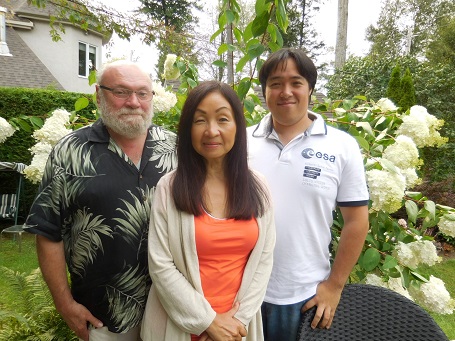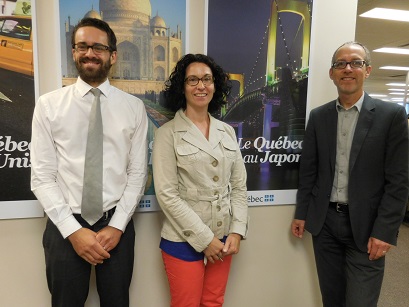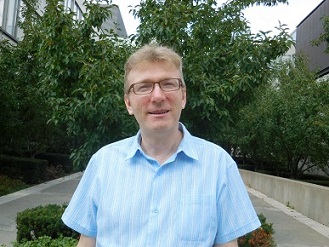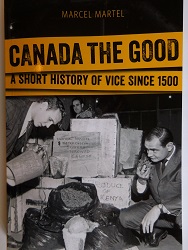シャロン博士夫妻、息子さんとの会話 Talk with Dr & Mrs Charron & their son [レポート Report]
シャロン博士夫妻と道雄さんとの会話:モンレアル(モントリオール)にて(2015年8月29日)
Conversation with Dr. Charron, Misa and Michio Hirai in Montreal
クロード=イヴ・シャロン博士、平井みさ夫人、道雄さん:モンレアルのお宅の裏庭にて
Claude=Yves Charron, Misa and Michio Hirai in the backyard of their house

8月29日(土)に、モンレアル郊外にあるクロード=イヴ・シャロン先生のご自宅に招待され、裏庭でランチをごちそうになりながら、先生と奥様のみさ夫人と息子さんの道雄さんとの会話を楽しみました。
まず、シャロン先生はケベックで日本の情報がなかなか入手できず、マスコミも日本の政治・社会・文化などをあまり伝えていないので、情報ギャップを感じている。時折TTP(環太平洋戦略的経済連携協定)の交渉との関連で日本が取り上げられることもあるが、この協定が持つ日本対中国のアジア太平洋地域の覇権に関する地政学的な意味を分析しているものは見当たらないとのこと。
ただし、日本からの情報発信の不十分さもあってマスコミであまり日本が取り上げられないにもかかわらず、こちらの人々は老若男女を問わず、ますます日本の文化や社会に対する関心を高めており、日本についての展示やイベントに多くの人が参加しているとのことで、例えばケベック州最大のアニメ・コンベンションであるOtakuthonや広島原爆投下70周年を記念するケント・ナガノ率いるモンレアル管弦楽団のコンサートなどに大勢の人が参加したそうです。(http://www.rcinet.ca/fr/2015/08/05/hiroshima-70-ans-apres-montreal-sen-souvient/)
これを受けて、みさ夫人がご自分で教えているケベック大学モンレアル校での日本語のコースを履修する学生数は、三年前から急激に増え、今年は350名になり、中国語を履修する学生数の三倍近くにもなったことを指摘されました。これはおそらく学生たちの間で、マンガ、アニメ、ゲーム、映画、ファッション、デザインなどのポップカルチャーへの興味が高まっているためと思われますが、より広い日本文化、歴史、社会などに対する興味に結びつく第一歩であろうと言われていました。
ここで遅れてランチに参加された息子さんの道雄さんが会話に加わり、友達の多くがOtakuthonなどのイベントに参加しており、そのうち何人かが日本に行って大変気に入り、日本に住みたがったが、しかし日本は旅行するのと住むとでは大違いで、東京のような国際都市でもまだ外国人に対する居住および職業上の規制や差別がたくさんあるとコメントされました。一つの例として、過去数年間日本でアニメソングの歌手として活躍したカナダ人の女性歌手のHIMEKAが、昨年所属プロが見つからず日本を去らざるをえなかったことがあげられました。
道雄さん自身も、二年ほど前にインターンで東京に滞在した際、色々と楽しい思いをしたものの、仕事の上で夜10~11時まで仲間と一緒に働かざるをえないという日本人の仕事のやり方にはなかなか慣れなかったとのことでした。
私を含めて四人が会話の結論として、日本には興味深く価値のあるコンテンツやイベントや遺産などがたくさんあることは高く評価できるものの、それらをカナダやその他の国の人々にもっとはっきり分かるようにまた受け入れられやすいように改善し改革する余地もまた多くあるということで同意しました。
参考:
シャロン博士夫妻との会食と意見交換(2008/6/28)
http://japanquebec.blog76.fc2.com/blog-entry-44.html
シャロン博士のインタビュー(2007/8/30)
http://japanquebec.blog76.fc2.com/blog-entry-24.html
------------------------------------------------------------------------------------------
[ English ]
On Saturday, August 29, I was invited to Dr. Claude=Yves Charron’s house in a suburb of Montreal, where I had a very enjoyable conversation with Dr. Charron, his wife Misa Hira along with their son Michio over lunch in their backyard.
First, Dr. Charron pointed out some delays and gaps in information about Japan in Quebec with virtually no reference to Japan’s politics, business, or society in the mass media these days. Even though Japan has sometimes been mentioned in connection with the Trans-Pacific Partnership agreement, no analysis is done regarding its geopolitical implications on Japan vis-à-vis China’s hegemony in the Asia-Pacific region.
However, he said that despite this lack of information about Japan in the mass media, which may at least partly be due to the insufficient information disseminated from Japan, more and more people, both young and old, seem to be attracted to Japanese culture and society and attending various events and exhibitions about Japan, such as Otakuthon, which is Quebec’s largest anime convention, and the Hiroshima memorial concert by the Montreal Symphony Orchestra and its music director, Kent Nagano (http://www.rcinet.ca/fr/2015/08/05/hiroshima-70-ans-apres-montreal-sen-souvient/).
Then, Mrs. Misa Hirai, who is teaching Japanese at the University of Quebec at Montreal, commented that the enrollment in her Japanese language course started to increase significant three years ago and is about 350 students this year, almost three times as many as those studying the Chinese language.
According to her, this may well be due to students’ increasing interest in Japan’s pop culture such as manga, anime, games, movies, fashion, design, etc., and this seems to be a good first step toward wider interests in Japanese culture, history and society in general.
Later their son Michio joined the conversation, saying that quite a few friends of his, who actively participated in Otakuthon and other similar events, have visited Japan and wanted to stay there, but visiting Japan is one thing and living there is another. There are still numerous obstacles for foreigners to live even in a cosmopolitan city like Tokyo, such as formal restrictions and informal discriminations on residential arrangements and professional activities. He pointed out the example of Canadian anime song singer, HIMEKA, who had to give up her career in Japan last year for failing to find a new agency to sponsor her stay after a several years of successful singing career in Japan.
Michio himself, while having mostly enjoyed his stay in Tokyo on his internship program a couple of years ago, sometimes found it difficult to adapt to Japanese behavior at work such as long working hours, staying up with his colleagues until 10 or 11pm.
As a conclusion, the four of us, including myself, agreed that while we all recognize and appreciate so many interesting and valuable contents, events and heritages in Japan, there is much room for improvement and reform to make them more visible and acceptable to the general public in Canada and elsewhere around the world.
References:
Talk with Dr. and Mrs. Charron (6/28/2008):
http://japanquebec.blog76.fc2.com/blog-entry-44.html
Interview with Dr. Charron (8/30/2007):
http://japanquebec.blog76.fc2.com/blog-entry-24.html
---------------------------------------------------------------------------------------
Conversation with Dr. Charron, Misa and Michio Hirai in Montreal
クロード=イヴ・シャロン博士、平井みさ夫人、道雄さん:モンレアルのお宅の裏庭にて
Claude=Yves Charron, Misa and Michio Hirai in the backyard of their house

8月29日(土)に、モンレアル郊外にあるクロード=イヴ・シャロン先生のご自宅に招待され、裏庭でランチをごちそうになりながら、先生と奥様のみさ夫人と息子さんの道雄さんとの会話を楽しみました。
まず、シャロン先生はケベックで日本の情報がなかなか入手できず、マスコミも日本の政治・社会・文化などをあまり伝えていないので、情報ギャップを感じている。時折TTP(環太平洋戦略的経済連携協定)の交渉との関連で日本が取り上げられることもあるが、この協定が持つ日本対中国のアジア太平洋地域の覇権に関する地政学的な意味を分析しているものは見当たらないとのこと。
ただし、日本からの情報発信の不十分さもあってマスコミであまり日本が取り上げられないにもかかわらず、こちらの人々は老若男女を問わず、ますます日本の文化や社会に対する関心を高めており、日本についての展示やイベントに多くの人が参加しているとのことで、例えばケベック州最大のアニメ・コンベンションであるOtakuthonや広島原爆投下70周年を記念するケント・ナガノ率いるモンレアル管弦楽団のコンサートなどに大勢の人が参加したそうです。(http://www.rcinet.ca/fr/2015/08/05/hiroshima-70-ans-apres-montreal-sen-souvient/)
これを受けて、みさ夫人がご自分で教えているケベック大学モンレアル校での日本語のコースを履修する学生数は、三年前から急激に増え、今年は350名になり、中国語を履修する学生数の三倍近くにもなったことを指摘されました。これはおそらく学生たちの間で、マンガ、アニメ、ゲーム、映画、ファッション、デザインなどのポップカルチャーへの興味が高まっているためと思われますが、より広い日本文化、歴史、社会などに対する興味に結びつく第一歩であろうと言われていました。
ここで遅れてランチに参加された息子さんの道雄さんが会話に加わり、友達の多くがOtakuthonなどのイベントに参加しており、そのうち何人かが日本に行って大変気に入り、日本に住みたがったが、しかし日本は旅行するのと住むとでは大違いで、東京のような国際都市でもまだ外国人に対する居住および職業上の規制や差別がたくさんあるとコメントされました。一つの例として、過去数年間日本でアニメソングの歌手として活躍したカナダ人の女性歌手のHIMEKAが、昨年所属プロが見つからず日本を去らざるをえなかったことがあげられました。
道雄さん自身も、二年ほど前にインターンで東京に滞在した際、色々と楽しい思いをしたものの、仕事の上で夜10~11時まで仲間と一緒に働かざるをえないという日本人の仕事のやり方にはなかなか慣れなかったとのことでした。
私を含めて四人が会話の結論として、日本には興味深く価値のあるコンテンツやイベントや遺産などがたくさんあることは高く評価できるものの、それらをカナダやその他の国の人々にもっとはっきり分かるようにまた受け入れられやすいように改善し改革する余地もまた多くあるということで同意しました。
参考:
シャロン博士夫妻との会食と意見交換(2008/6/28)
http://japanquebec.blog76.fc2.com/blog-entry-44.html
シャロン博士のインタビュー(2007/8/30)
http://japanquebec.blog76.fc2.com/blog-entry-24.html
------------------------------------------------------------------------------------------
[ English ]
On Saturday, August 29, I was invited to Dr. Claude=Yves Charron’s house in a suburb of Montreal, where I had a very enjoyable conversation with Dr. Charron, his wife Misa Hira along with their son Michio over lunch in their backyard.
First, Dr. Charron pointed out some delays and gaps in information about Japan in Quebec with virtually no reference to Japan’s politics, business, or society in the mass media these days. Even though Japan has sometimes been mentioned in connection with the Trans-Pacific Partnership agreement, no analysis is done regarding its geopolitical implications on Japan vis-à-vis China’s hegemony in the Asia-Pacific region.
However, he said that despite this lack of information about Japan in the mass media, which may at least partly be due to the insufficient information disseminated from Japan, more and more people, both young and old, seem to be attracted to Japanese culture and society and attending various events and exhibitions about Japan, such as Otakuthon, which is Quebec’s largest anime convention, and the Hiroshima memorial concert by the Montreal Symphony Orchestra and its music director, Kent Nagano (http://www.rcinet.ca/fr/2015/08/05/hiroshima-70-ans-apres-montreal-sen-souvient/).
Then, Mrs. Misa Hirai, who is teaching Japanese at the University of Quebec at Montreal, commented that the enrollment in her Japanese language course started to increase significant three years ago and is about 350 students this year, almost three times as many as those studying the Chinese language.
According to her, this may well be due to students’ increasing interest in Japan’s pop culture such as manga, anime, games, movies, fashion, design, etc., and this seems to be a good first step toward wider interests in Japanese culture, history and society in general.
Later their son Michio joined the conversation, saying that quite a few friends of his, who actively participated in Otakuthon and other similar events, have visited Japan and wanted to stay there, but visiting Japan is one thing and living there is another. There are still numerous obstacles for foreigners to live even in a cosmopolitan city like Tokyo, such as formal restrictions and informal discriminations on residential arrangements and professional activities. He pointed out the example of Canadian anime song singer, HIMEKA, who had to give up her career in Japan last year for failing to find a new agency to sponsor her stay after a several years of successful singing career in Japan.
Michio himself, while having mostly enjoyed his stay in Tokyo on his internship program a couple of years ago, sometimes found it difficult to adapt to Japanese behavior at work such as long working hours, staying up with his colleagues until 10 or 11pm.
As a conclusion, the four of us, including myself, agreed that while we all recognize and appreciate so many interesting and valuable contents, events and heritages in Japan, there is much room for improvement and reform to make them more visible and acceptable to the general public in Canada and elsewhere around the world.
References:
Talk with Dr. and Mrs. Charron (6/28/2008):
http://japanquebec.blog76.fc2.com/blog-entry-44.html
Interview with Dr. Charron (8/30/2007):
http://japanquebec.blog76.fc2.com/blog-entry-24.html
---------------------------------------------------------------------------------------
ケベック州政府国際関係省での対話 Conversation at Quebec Gov’t Ministry of Int’l Relations (MRIF) [Report]
ケベック州政府国際関係省での対話(2015年8月31日)
Conversation at Quebec Gov’t Ministry of Int’l Relations (MRIF)
エティエンヌ・バイヤルジョン氏、モード・コテ女史、ドナルド・ルブラン氏
M. Etienne Baillargeon, Mme. Maude Cote, and M. Donald Leblanc

8月31日(月)に、ケベック市の州政府国際関係省(MRIF)の本部を訪れ、アジア・日本担当であるドナルド・ルブラン氏(アジア太平洋、ラテンアメリカ、カリブ諸国担当ディレクター)、モード・コテ女史(日本、韓国、オセアニア担当チーフ)とエティエンヌ・バイヤルジョン氏(日本、韓国、オセアニア担当官)の3名と会うことができた。
州政府の担当者と会見する目的は、日本とケベックにかかわる最近の文化活動についての意見や情報を交換することであった。
最初に驚いたのは、ケベックの担当官たちが日本のポップカルチャーやクールジャパンに対して持つ関心の強さで、その質問に答えて、まず私から日本政府がアニメ、マンガ、ゲーム、映画、ファッション、デザイン、さらには和食などのポピュラーカルチャーを支援してそれに関するグッズやサービスを海外に売り込むとともに、2016年の三重県伊勢志摩サミットや2020の東京オリンピックに向けて外国人の観光客を日本に呼び込もうという最近のクールジャパン戦略について説明した。
実際、ここでこのようなテーマについて議論するのはタイミング的にも場所的にもまさにベストで、ちょうど州政府の庁舎の近くにあるケベック州美術館(http://www.mnbaq.org/)で、日本に関する特別展示が行われていた。それは「ジャポニズム」の時代を取り上げた「Inspiration Japon」とケベックのアーティストによる日本の伝統を題材とするポップアート「Nippon-Fiction」というもので、私は国際関係省を訪れる前にこれらの展示を見て回って大いにエンジョイすることができた。
それから州政府担当者たちと、日本とケベックの間でどのようにアーティストやクリエーターの交流を促進することができるかを議論したが、すでにダンスパフォーマーについてはケベックから何人かが州政府の支援を得て日本に短期間滞在し交流を深めているが、逆に日本のアーティストやパフォーマーが日本政府の支援でケベックに滞在するプログラムはこれまでなかったのではないかという点が、州政府担当者から指摘された。それについては、アニメ、マンガ、ゲーム、映画、日本食料理などの分野で、現在日本政府が「クールジャパン戦略」の一環として考えているのではないかという期待も表明された。
さらに、日本とケベックのアーティストやクリエーターとスポンサーやビジネスの間を取り持って、情報交換やビジネス交流を促進するようなプラットフォームのウェブサイトを立ち上げる可能性などが議論されたが、重要な問題は、どうやって質的および法律的な要件をクリアーして、国境を越えた真の協力を促進することができるかということであった。暫定的な結論は、まず第一歩として、例えば日本とケベックの映画産業の協会などが相互の交流を促進するためのプラットフォームづくりに興味を示すべきで、そのような段階を踏んで、やがて長期的により包括的で横断的な形でアーティストやクリエーターと受け入れ機関やビジネス組織とを引き合わせるプラットフォームが生まれてくるであろうという展望が示された。
指摘されるべきは、以上のような議論がすべて予定通り1時間以内に行われたということで、それはケベック政府ないし国際関係省がいかに物事を効率的に処理しているかを示しているものと思われる。その間、3名の担当官は非常に友好的かつ生産的な態度で接してくれたことが印象的であった。そのような態度から日本の政府関係者も大いに学んでほしいものである。
参考:
日本でのケベック州首相の講演(2011年8月)
http://japanquebec.blog76.fc2.com/blog-entry-76.html
モンレアル・ケベック訪問(2007年8月)
http://japanquebec.blog76.fc2.com/blog-date-200709.html
------------------------------------------------------------------------------------------
Conversation at Quebec Gov’t Ministry of Int’l Relations (MRIF)
On Monday, August 31, I visited the Ministry of International Relations and Francophonie (MRIF) at the Headquarter Building in Quebec city, where I was greeted by three officials in charge of Asia and Japan, M. Donald Leblanc (Asia-Pacific, Latin America and Caribbean Director), Mme. Maude Cote (Chief of the Japan, Korea and Oceania Desk), and M. Etienne Baillargeon (Officer at the Japan, Korea and Oceania Desk).
The main purpose of my visit was to exchange opinions and information with the Quebec officials about recent cultural activities concerning both Japan and Quebec.
First, in response to the surprisingly strong interest in Japan’s pop culture and the “Cool Japan” concept on the part of the Quebec officials, I tried to outline the recent strategy of the Japanese government to promote and support Japan’s popular culture such as anime, manga, games, films, fashion, design, cuisine, etc. for the purpose of marketing pop culture-related goods and services abroad as well as attracting foreign tourists to Japan in connection with the 2016 Summit in Mie Prefecture and the 2020 Olympics in Tokyo.
The timing and location for our discussion on this subject matter seemed perfect, as the National Museum of Fine Arts of Quebec near the Parliament Building (http://www.mnbaq.org/) was featuring the special exhibitions about Japan, “Inspiration Japon” (Japonism) and “Nippon-Fiction” (a Quebec artist’s traditional Japanese-style pop culture), which I enjoyed viewing, prior to my meeting at the Ministry.
Then, we discussed possible ways to encourage the exchange of artists and creators between Japan and Quebec. As pointed out by the officials, a number of Quebec artists such as dance performers have visited Japan for a short stay supported by the Quebec government, but there has not been any such arrangement for Japanese artists to stay in Quebec supported by the Japanese government so far, and it might well be under consideration by the Japanese government in the context of the Cool Japan strategy, especially in some pop culture fields such as anime, manga, games, films, cuisine, etc.
Then our discussion led to a possibility of creating a kind of “matching site” as a platform to introduce artists and creators on one hand and sponsors and business people on the other to facilitate mutual exchange of information and possibly business interaction between Japan and Quebec. However, the important question about this idea is how to meet the “quality” and “legal” requirements for real collaboration between them across national boundaries. Our tentative conclusion was that as a first step professional organizations such as film industries in Japan and Quebec could be interested in creating a platform for more active interactions between Japanese and Quebec film industries. As a result of this kind of step-by-step approach, a more comprehensive, across-the-board matching platform for artists/creators and hosting/business organizations might emerge in the long run.
All this discussion took place within an hour as planned, which implies how efficient the Quebec government, or at least the MRIF, operates, and I truly enjoyed talking with those three officials in such a friendly and productive manner, hoping that Japanese government officials could learn from them in this respect.
References:
Quebec Premier’s speech in Japan (August, 2011):
http://japanquebec.blog76.fc2.com/blog-entry-76.html
My visit to Montreal and Quebec city (August, 2007):
http://japanquebec.blog76.fc2.com/blog-date-200709.html
------------------------------------------------------------------------------------------
Conversation at Quebec Gov’t Ministry of Int’l Relations (MRIF)
エティエンヌ・バイヤルジョン氏、モード・コテ女史、ドナルド・ルブラン氏
M. Etienne Baillargeon, Mme. Maude Cote, and M. Donald Leblanc

8月31日(月)に、ケベック市の州政府国際関係省(MRIF)の本部を訪れ、アジア・日本担当であるドナルド・ルブラン氏(アジア太平洋、ラテンアメリカ、カリブ諸国担当ディレクター)、モード・コテ女史(日本、韓国、オセアニア担当チーフ)とエティエンヌ・バイヤルジョン氏(日本、韓国、オセアニア担当官)の3名と会うことができた。
州政府の担当者と会見する目的は、日本とケベックにかかわる最近の文化活動についての意見や情報を交換することであった。
最初に驚いたのは、ケベックの担当官たちが日本のポップカルチャーやクールジャパンに対して持つ関心の強さで、その質問に答えて、まず私から日本政府がアニメ、マンガ、ゲーム、映画、ファッション、デザイン、さらには和食などのポピュラーカルチャーを支援してそれに関するグッズやサービスを海外に売り込むとともに、2016年の三重県伊勢志摩サミットや2020の東京オリンピックに向けて外国人の観光客を日本に呼び込もうという最近のクールジャパン戦略について説明した。
実際、ここでこのようなテーマについて議論するのはタイミング的にも場所的にもまさにベストで、ちょうど州政府の庁舎の近くにあるケベック州美術館(http://www.mnbaq.org/)で、日本に関する特別展示が行われていた。それは「ジャポニズム」の時代を取り上げた「Inspiration Japon」とケベックのアーティストによる日本の伝統を題材とするポップアート「Nippon-Fiction」というもので、私は国際関係省を訪れる前にこれらの展示を見て回って大いにエンジョイすることができた。
それから州政府担当者たちと、日本とケベックの間でどのようにアーティストやクリエーターの交流を促進することができるかを議論したが、すでにダンスパフォーマーについてはケベックから何人かが州政府の支援を得て日本に短期間滞在し交流を深めているが、逆に日本のアーティストやパフォーマーが日本政府の支援でケベックに滞在するプログラムはこれまでなかったのではないかという点が、州政府担当者から指摘された。それについては、アニメ、マンガ、ゲーム、映画、日本食料理などの分野で、現在日本政府が「クールジャパン戦略」の一環として考えているのではないかという期待も表明された。
さらに、日本とケベックのアーティストやクリエーターとスポンサーやビジネスの間を取り持って、情報交換やビジネス交流を促進するようなプラットフォームのウェブサイトを立ち上げる可能性などが議論されたが、重要な問題は、どうやって質的および法律的な要件をクリアーして、国境を越えた真の協力を促進することができるかということであった。暫定的な結論は、まず第一歩として、例えば日本とケベックの映画産業の協会などが相互の交流を促進するためのプラットフォームづくりに興味を示すべきで、そのような段階を踏んで、やがて長期的により包括的で横断的な形でアーティストやクリエーターと受け入れ機関やビジネス組織とを引き合わせるプラットフォームが生まれてくるであろうという展望が示された。
指摘されるべきは、以上のような議論がすべて予定通り1時間以内に行われたということで、それはケベック政府ないし国際関係省がいかに物事を効率的に処理しているかを示しているものと思われる。その間、3名の担当官は非常に友好的かつ生産的な態度で接してくれたことが印象的であった。そのような態度から日本の政府関係者も大いに学んでほしいものである。
参考:
日本でのケベック州首相の講演(2011年8月)
http://japanquebec.blog76.fc2.com/blog-entry-76.html
モンレアル・ケベック訪問(2007年8月)
http://japanquebec.blog76.fc2.com/blog-date-200709.html
------------------------------------------------------------------------------------------
Conversation at Quebec Gov’t Ministry of Int’l Relations (MRIF)
On Monday, August 31, I visited the Ministry of International Relations and Francophonie (MRIF) at the Headquarter Building in Quebec city, where I was greeted by three officials in charge of Asia and Japan, M. Donald Leblanc (Asia-Pacific, Latin America and Caribbean Director), Mme. Maude Cote (Chief of the Japan, Korea and Oceania Desk), and M. Etienne Baillargeon (Officer at the Japan, Korea and Oceania Desk).
The main purpose of my visit was to exchange opinions and information with the Quebec officials about recent cultural activities concerning both Japan and Quebec.
First, in response to the surprisingly strong interest in Japan’s pop culture and the “Cool Japan” concept on the part of the Quebec officials, I tried to outline the recent strategy of the Japanese government to promote and support Japan’s popular culture such as anime, manga, games, films, fashion, design, cuisine, etc. for the purpose of marketing pop culture-related goods and services abroad as well as attracting foreign tourists to Japan in connection with the 2016 Summit in Mie Prefecture and the 2020 Olympics in Tokyo.
The timing and location for our discussion on this subject matter seemed perfect, as the National Museum of Fine Arts of Quebec near the Parliament Building (http://www.mnbaq.org/) was featuring the special exhibitions about Japan, “Inspiration Japon” (Japonism) and “Nippon-Fiction” (a Quebec artist’s traditional Japanese-style pop culture), which I enjoyed viewing, prior to my meeting at the Ministry.
Then, we discussed possible ways to encourage the exchange of artists and creators between Japan and Quebec. As pointed out by the officials, a number of Quebec artists such as dance performers have visited Japan for a short stay supported by the Quebec government, but there has not been any such arrangement for Japanese artists to stay in Quebec supported by the Japanese government so far, and it might well be under consideration by the Japanese government in the context of the Cool Japan strategy, especially in some pop culture fields such as anime, manga, games, films, cuisine, etc.
Then our discussion led to a possibility of creating a kind of “matching site” as a platform to introduce artists and creators on one hand and sponsors and business people on the other to facilitate mutual exchange of information and possibly business interaction between Japan and Quebec. However, the important question about this idea is how to meet the “quality” and “legal” requirements for real collaboration between them across national boundaries. Our tentative conclusion was that as a first step professional organizations such as film industries in Japan and Quebec could be interested in creating a platform for more active interactions between Japanese and Quebec film industries. As a result of this kind of step-by-step approach, a more comprehensive, across-the-board matching platform for artists/creators and hosting/business organizations might emerge in the long run.
All this discussion took place within an hour as planned, which implies how efficient the Quebec government, or at least the MRIF, operates, and I truly enjoyed talking with those three officials in such a friendly and productive manner, hoping that Japanese government officials could learn from them in this respect.
References:
Quebec Premier’s speech in Japan (August, 2011):
http://japanquebec.blog76.fc2.com/blog-entry-76.html
My visit to Montreal and Quebec city (August, 2007):
http://japanquebec.blog76.fc2.com/blog-date-200709.html
------------------------------------------------------------------------------------------
マルセル・マルテル教授との対話 Conversation with Prof. Marcel Martel [レポート Report]
マルセル・マルテル教授との対話 @ヨーク大学(2015年9月2日)
Conversation with Prof. Marcel Martel @York University (Sept. 2, 2015)
マルセル・マルテル教授と最新著書:Prof. Marcel Martel & His Most Recent Book


9月2日(火)にトロントのヨーク大学を訪れ、マルセル・マルテル教授に会って、現在進めている研究についてお聞きした。ちょうと秋学期が始まる直前だったため、キャンパスはとても静かで、居心地のよい教員用のダイニングルームでランチを取りながらゆっくり話をすることができた。
まずマルテル教授は、最新の著書『Canada the Good』(2014年)に言及し、昨年日本で行った講演のいくつかはこの著書の内容に基づいていたことを指摘した。さらに現在行っている研究テーマは何かという質問に対しては、「カナダ人のアイデンティティ」というテーマに取り組んでいるとのことであった。実際に、英語を母国語とするカナダ人の多くはヴィクトリア王女の誕生日を祝い、フランス語を母国語とするカナダ人はセントジョン・バプティストの日を祝うといったような社会で、カナダ人のアイデンティティがどう定義され、どう共有されるのかはまだ不明である。
それは、アメリカ合衆国のような「メルティング・ポット(るつぼ)社会」と異なり、カナダのような「モザイク社会」では、いつまでも引きずっていく問題ともいえる。したがって、マルテル教授の野心的な研究の成果が、いかに暫定的なものであっても、今から期待されるところである。
その後、話題は日本のポップカルチャーのトピックに移り、マルテル教授によれば、このところアニメ、マンガ、寿司などがトロントで大いに注目を集めているとのことであった。日本食については、その主な食材である魚や野菜が健康食として認識されたことが人気に火をつけたといえるが、この「ハイカルチャー」という性格は日本のポップカルチャーの他のジャンルにも当てはまり、例えばアニメでは、宮崎駿の芸術的なアニメが日本のアニメを、子供用のコミックというよりは、一種の芸術作品にしたことが、広く世界中の老若男女を引き付ける結果になったといえる。
マルテル教授との話の結論として、ある国のポピュラーカルチャーが他国に浸透する歴史と戦略について比較研究することは、例えば日本と韓国のポップカルチャーが北アメリカで受け入れられる過程の違いを研究するといったように非常に興味深いものではないかということであった。
参考:
マルセル・マルテル著『Canada the Good: A Short History of Vice since 1500』(2014年、 WLU Press)
http://www.wlupress.wlu.ca/Catalog/martel-m.shtml
マルセル・マルテル教授の日本での講演(2014年10~11月)
http://ajeq14.blog.fc2.com/blog-entry-19.html
-------------------------------------------------------------------------------------------
Conversation with Prof. Marcel Martel @York University
On Wednesday, September 2, I visited York University in Toronto, where I met Professor Marcel Martel and asked him about his current research interest. Since it was just before the fall semester starts, the campus was very quiet and we had a leisurely conversation over lunch at a nice faculty dining room.
First, Prof. Martel referred to his new book, Canada the Good: A Short History of Vice since 1500 (2014), which was a basis for some of the speeches that he gave in Japan last year. Then, in response to my question about his current research agenda, he said he is now working on the issue of the “Canadian identity,” which is yet to be defined and shared by all citizens in a society, where most of the English-speaking Canadians celebrate Queen Victoria’s Birthday, French-speaking Canadians honor St Jean-Baptiste Day, etc.
That sounded like an ever-lingering problem in what might be called a “mosaic” society, rather than a “melting pot” like the United States of America. So, I am anxious to know a conclusion, however tentative, of his ambitious research to deal with this problem.
Then, our conversation turned to the topic of Japanese popular culture such as anime, manga and sushi, which are attracting more and more attention from Torontonians these days, according to Prof. Martel. He pointed out that, especially in the case of Japanese food, it has become so popular, because it is healthy to each fish and vegetables, which are the main ingredients of Japanese cuisine. This “high culture” aspect might also apply to other genres of Japanese pop culture such as anime, where Hayao Miyazaki’s artistic works have made Japanese amine a kind of fine art, rather than children’s comics, leading to the wide popularity among the young and the old all over the world.
Prof. Martel and I agreed that it would be quite interesting to study the history and strategy of a country’s popular culture to penetrate into other countries with different cultural backgrounds from the comparative viewpoint, such as Japanese vs. Korean pop culture accepted in North America in somewhat different ways.
References:
Marcel Martel, Canada the Good: A Short History of Vice since 1500 (WLU Press, 2014):
http://www.wlupress.wlu.ca/Catalog/martel-m.shtml
Reports on Prof. Marcel Martel’s lectures in Japan (October/November 2014):
http://ajeq14.blog.fc2.com/blog-entry-19.html
-------------------------------------------------------------------------------------------
Conversation with Prof. Marcel Martel @York University (Sept. 2, 2015)
マルセル・マルテル教授と最新著書:Prof. Marcel Martel & His Most Recent Book


9月2日(火)にトロントのヨーク大学を訪れ、マルセル・マルテル教授に会って、現在進めている研究についてお聞きした。ちょうと秋学期が始まる直前だったため、キャンパスはとても静かで、居心地のよい教員用のダイニングルームでランチを取りながらゆっくり話をすることができた。
まずマルテル教授は、最新の著書『Canada the Good』(2014年)に言及し、昨年日本で行った講演のいくつかはこの著書の内容に基づいていたことを指摘した。さらに現在行っている研究テーマは何かという質問に対しては、「カナダ人のアイデンティティ」というテーマに取り組んでいるとのことであった。実際に、英語を母国語とするカナダ人の多くはヴィクトリア王女の誕生日を祝い、フランス語を母国語とするカナダ人はセントジョン・バプティストの日を祝うといったような社会で、カナダ人のアイデンティティがどう定義され、どう共有されるのかはまだ不明である。
それは、アメリカ合衆国のような「メルティング・ポット(るつぼ)社会」と異なり、カナダのような「モザイク社会」では、いつまでも引きずっていく問題ともいえる。したがって、マルテル教授の野心的な研究の成果が、いかに暫定的なものであっても、今から期待されるところである。
その後、話題は日本のポップカルチャーのトピックに移り、マルテル教授によれば、このところアニメ、マンガ、寿司などがトロントで大いに注目を集めているとのことであった。日本食については、その主な食材である魚や野菜が健康食として認識されたことが人気に火をつけたといえるが、この「ハイカルチャー」という性格は日本のポップカルチャーの他のジャンルにも当てはまり、例えばアニメでは、宮崎駿の芸術的なアニメが日本のアニメを、子供用のコミックというよりは、一種の芸術作品にしたことが、広く世界中の老若男女を引き付ける結果になったといえる。
マルテル教授との話の結論として、ある国のポピュラーカルチャーが他国に浸透する歴史と戦略について比較研究することは、例えば日本と韓国のポップカルチャーが北アメリカで受け入れられる過程の違いを研究するといったように非常に興味深いものではないかということであった。
参考:
マルセル・マルテル著『Canada the Good: A Short History of Vice since 1500』(2014年、 WLU Press)
http://www.wlupress.wlu.ca/Catalog/martel-m.shtml
マルセル・マルテル教授の日本での講演(2014年10~11月)
http://ajeq14.blog.fc2.com/blog-entry-19.html
-------------------------------------------------------------------------------------------
Conversation with Prof. Marcel Martel @York University
On Wednesday, September 2, I visited York University in Toronto, where I met Professor Marcel Martel and asked him about his current research interest. Since it was just before the fall semester starts, the campus was very quiet and we had a leisurely conversation over lunch at a nice faculty dining room.
First, Prof. Martel referred to his new book, Canada the Good: A Short History of Vice since 1500 (2014), which was a basis for some of the speeches that he gave in Japan last year. Then, in response to my question about his current research agenda, he said he is now working on the issue of the “Canadian identity,” which is yet to be defined and shared by all citizens in a society, where most of the English-speaking Canadians celebrate Queen Victoria’s Birthday, French-speaking Canadians honor St Jean-Baptiste Day, etc.
That sounded like an ever-lingering problem in what might be called a “mosaic” society, rather than a “melting pot” like the United States of America. So, I am anxious to know a conclusion, however tentative, of his ambitious research to deal with this problem.
Then, our conversation turned to the topic of Japanese popular culture such as anime, manga and sushi, which are attracting more and more attention from Torontonians these days, according to Prof. Martel. He pointed out that, especially in the case of Japanese food, it has become so popular, because it is healthy to each fish and vegetables, which are the main ingredients of Japanese cuisine. This “high culture” aspect might also apply to other genres of Japanese pop culture such as anime, where Hayao Miyazaki’s artistic works have made Japanese amine a kind of fine art, rather than children’s comics, leading to the wide popularity among the young and the old all over the world.
Prof. Martel and I agreed that it would be quite interesting to study the history and strategy of a country’s popular culture to penetrate into other countries with different cultural backgrounds from the comparative viewpoint, such as Japanese vs. Korean pop culture accepted in North America in somewhat different ways.
References:
Marcel Martel, Canada the Good: A Short History of Vice since 1500 (WLU Press, 2014):
http://www.wlupress.wlu.ca/Catalog/martel-m.shtml
Reports on Prof. Marcel Martel’s lectures in Japan (October/November 2014):
http://ajeq14.blog.fc2.com/blog-entry-19.html
-------------------------------------------------------------------------------------------



